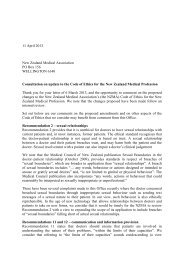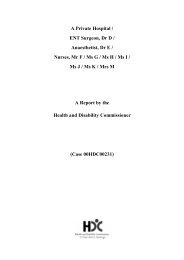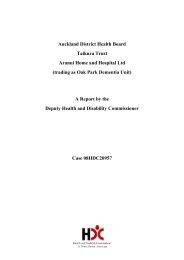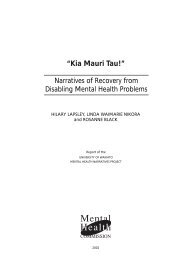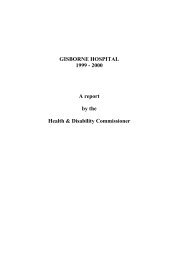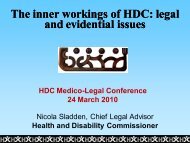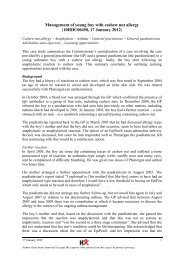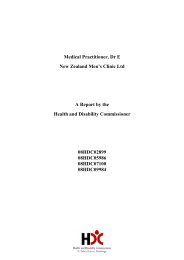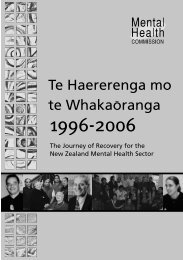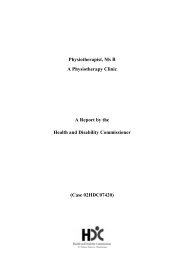09HDC01565 - Health and Disability Commissioner
09HDC01565 - Health and Disability Commissioner
09HDC01565 - Health and Disability Commissioner
You also want an ePaper? Increase the reach of your titles
YUMPU automatically turns print PDFs into web optimized ePapers that Google loves.
<strong>Health</strong> <strong>and</strong> <strong>Disability</strong> <strong>Commissioner</strong><br />
156. Dr E considers it unfair to conclude that patients should be explicitly told who is<br />
operating in ―most‖ cases, ―when there is an equally logical conclusion that can be<br />
drawn by reasonable patients … <strong>and</strong> a simple step reasonable patients can take if they<br />
hold concerns about the identity of the person performing the operation‖. Dr E states<br />
that ―the reasonable patient in [Mr A‘s] circumstances would ask if this was an issue<br />
of concern‖. Dr E states that he has spoken to surgical <strong>and</strong> anaesthetic colleagues in<br />
New Zeal<strong>and</strong> <strong>and</strong> Australia, <strong>and</strong> the majority state their registrars/trainees usually do<br />
significant portions of a procedure under supervision without this being specifically<br />
discussed with the patient. Dr E therefore considers his practice is ―usual practice or<br />
even an acceptable st<strong>and</strong>ard of care‖.<br />
157. Dr E also notes the surgery was being performed in a public training hospital where<br />
most patients expect that junior doctors <strong>and</strong> training specialists will be involved in the<br />
treatment process. In addition, the consent form clearly stated that the procedure<br />
would be performed by an appropriate, not a specific person. As the form was signed<br />
by Mr A, Dr E submits it is reasonable to conclude Mr A had read <strong>and</strong> understood<br />
this, or if he did not read it, that it was not a high priority for him.<br />
158. Dr E states that a craniocervical decompression is essentially a high cervical spinal<br />
decompression, <strong>and</strong> in his view, this is ―not a ‗serious‘ operation in the spectrum of<br />
neurosurgical procedures‖.<br />
159. Dr E disagrees with Dr Nye‘s advice that there was ―an apparent lack of instruction<br />
given to nursing staff‖. Dr E states: ―Instructions were clear on postoperative orders,<br />
the patient was also monitored as per PCA protocol <strong>and</strong> there is an overriding<br />
neurosurgical postoperative care protocol in place.‖<br />
160. Dr E states that while the oxygen saturation probe is a useful tool it has many<br />
downfalls. He notes that oxygen saturation readings need to be considered in context<br />
with many other factors, <strong>and</strong> that ―a single reading is essentially meaningless unless<br />
accompanied by other clinical concerns‖.<br />
161. Dr E provided further information regarding his supervision of Dr G <strong>and</strong> Dr F. He<br />
states that registrars are instructed about the requirements for patient care <strong>and</strong><br />
department protocols, both in writing <strong>and</strong> verbally. He states that Dr G <strong>and</strong> Dr F were<br />
both instructed as to the requirements of his postoperative orders long before they<br />
looked after Mr A. The postoperative orders were ―according to‖ Dr E‘s expectations<br />
<strong>and</strong> wishes.<br />
162. Dr E notes he was Mr A‘s initial contact point, <strong>and</strong> set his treatment plan in action. He<br />
states that he ―oversaw <strong>and</strong> supervised the consent process‖, he was present during the<br />
surgical procedure, <strong>and</strong> he was happy with all stages of the operation.<br />
163. Dr E notes he asked his registrars about Mr A‘s well-being before leaving the<br />
hospital, <strong>and</strong> that it is his usual practice to have any concerns about patients under his<br />
supervision directed to him in the first instance, rather than to the consultant on call.<br />
Dr E states that he does not consider the consultant in charge is responsible for<br />
―policing the instructions left for junior <strong>and</strong> nursing staff in the deep hours of the<br />
5 September 2012 28<br />
Names have been removed (except Canterbury DHB <strong>and</strong> the experts who advised on this case) to<br />
protect privacy. Identifying letters are assigned in alphabetical order <strong>and</strong> bear no relationship to the<br />
person’s actual name.



